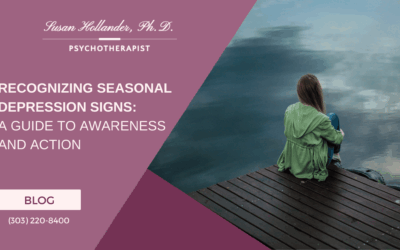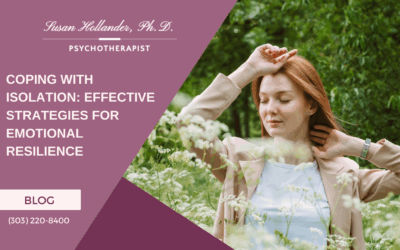Depression Therapy with Susan L. Hollander, PHD
In-Person and Online Depression Psychotherapy
Contact Me Today
Compassionate Depression Therapy for Englewood
Life can feel heavier when you’re navigating depression. When hope seems distant and everyday tasks become overwhelming, you don’t have to walk that path alone. At Dr. Susan L. Hollander’s practice, we offer depression counseling tailored for those in Englewood, Denver, and nearby Colorado communities.
Our approach is rooted in deep empathy, evidence-based modalities, and a belief in your capacity to heal. Whether you’re struggling with persistent sadness, low motivation, sleep disruption, or loss of interest in things you once enjoyed — we’re here to help you uncover the underlying roots and rebuild toward balance and renewal.
We understand the challenges that come with depression, especially in a fast-paced place like the Denver metro area. Our therapy provides a safe, supportive space where you can be heard, understood, and guided toward regaining engagement, meaning, and emotional well-being.
If you’re ready to explore how depression therapy near Englewood, CO might help you feel lighter, more connected, and more like yourself again, we invite you to reach out. Healing is a journey — let’s take the next step together.
When Life Feels Heavy, Therapy in Englewood Can Light the Way
In the quiet moments of morning, even getting out of bed feels like climbing a mountain. Some days, you go through the motions, smiling, working, engaging, yet inside, there’s a deep and unshakable sadness. You may feel disconnected from loved ones, from yourself, or from the life you once recognized. The things that once brought joy now feel far away.
Depression affects individuals in different ways, but the symptoms often echo a shared experience: low energy, hopelessness, and the quiet fear that real change is out of reach.
In Englewood, Colorado, Dr. Susan Hollander, Ph.D., offers a calming space for clients seeking depression therapy and support with other mental health challenges. With decades of experience in psychotherapy, Dr. Hollander helps adults and their families, if needed, cope with both acute and chronic depression, trauma, and the weight of life’s many transitions.
If you’re in the surrounding Colorado communities and are ready to explore counseling that truly meets you where you are, Dr. Hollander is here. Your journey toward happiness doesn’t have to be hard or lonely. It begins with a single appointment, and the courage to say: I’m ready.
Depression Doesn’t Always Look Like Depression
Depression doesn’t always arrive with a dramatic breakdown. Sometimes, it settles in quietly, after a loss, a major life change, or years of managing stress without enough support. On the surface, life may look fine, but inside, things feel heavy, disconnected, or hard to explain.
In a place like Englewood, Colorado, where people often carry on through pressure and expectation, it’s easy to overlook the symptoms of depression, especially when they show up as low energy, sadness, social asolation or feeling “off.”
Certain experiences increase the risk of depression, including unresolved trauma, a family history of mood disorders, or ongoing relationship conflict. It might be tied to grief, burnout, or a long-held sense of disconnection. For some, it’s been there as long as they can remember.
No matter how it began, depression convinces many to suffer in silence. But with the right support, you will begin to feel like yourself again.
If you’re unsure whether what you’re feeling is depression or you’ve simply gotten used to it, therapy may help you understand what’s really going on.
Could You Benefit from Depression Therapy?
Depression doesn’t always arrive as a crisis. It shows up as slow withdrawal, exhaustion, or the quiet sense that you’re no longer truly living. If you’re in Englewood and unsure what you’re feeling or what to do next, these questions may help:
- Have you lost interest in people or activities you once enjoyed?
- Do you feel disconnected from yourself, others, or life?
- Are your sleep or eating patterns off balance?
- Is there a constant sense of hopelessness, numbness, or low energy?
- Are you using substances to cope or escape?
- Have big changes or losses left you feeling drained or stuck?
- Do you catch yourself thinking, “I should be fine,” but still feel empty?
- Have you tried therapy before without relief?
Even one “yes” may be a sign that you’re carrying more than you need to alone.
Dr. Susan Hollander offers depression therapy in Englewood, Colorado, helping clients reconnect with themselves, understand their symptoms, and take the first step toward healing. Your past doesn’t define your future, but how you care for it can.
What Depression Therapy Looks Like with Dr. Hollander
Support that honors where you are, not where you “should” be
Starting therapy for depression isn’t about having answers. It begins with the courage to say, “Something feels off.” That’s more than enough.
In her Englewood, Colorado office, Dr. Susan Hollander provides compassionate, evidence-based mental health care that honors your process. With over 30 years of experience treating depression, she helps clients move through sadness, fatigue, and disconnection, one small step at a time.
In your sessions, you might:
- Explore family patterns and emotional history
- Work through grief, trauma, or long-held shame
- Use CBT to shift unhelpful thoughts
- Practice mindfulness or self-compassion techniques
- Uncover deeper emotions through psychodynamic psychotherapy
- Learn how to reconnect with motivation, joy, and the present moment
Many individuals come to therapy feeling like they’ve tried everything. You’re not broken, you’re simply carrying more than one person should have to.
Therapy offers a place to put it down, with care, insight, and someone who truly understands.
This might be your first step — or your tenth. Either way, it counts.
Let’s talk about what’s next. Reach out to schedule a consultation.
Are you feeling empty and numb?
Emotional numbness can make the world feel distant and disconnected. It’s often your mind’s way of coping with pain or burnout. In therapy, you can safely explore what’s beneath the numbness and begin to reconnect with your emotions. You’re not broken—you’re overwhelmed. Healing starts with being seen, heard, and supported without judgment.
Are you feeling hopeless about the future?
Hopelessness can feel like a heavy fog, clouding your ability to see a way forward. But even when it feels impossible, change is still possible. Therapy can help you rediscover purpose, shift your perspective, and build emotional resilience. Together, we’ll find ways to reignite hope—one small, meaningful step at a time.
Are you losing interest in what you used to love?
When joy disappears, it’s often a sign that something deeper needs attention. Losing interest in what once mattered can feel confusing and isolating, but you don’t have to stay stuck. Therapy offers tools and support to help you reconnect with yourself, rediscover purpose, and rebuild motivation—starting exactly where you are.
Dr. Susan Hollander, Ph.D. is here for you!
Meet Dr. Susan Hollander, Ph.D.
Licensed Therapist | Compassionate Listener | Experienced Guide
Dr. Susan Hollander is a licensed therapist with over 30 years of experience supporting adults through depression, anxiety, trauma, and major life transitions. With a Ph.D. in Social Work and advanced clinical training, she blends evidence-based treatment with deep empathy and real-world understanding.
Clients describe her as calm, thoughtful, and grounded — someone who truly listens and helps you find your way, even when the path feels unclear.
Are you ready to start healing?
Healing isn’t a straight line, but every journey begins with a choice. Whether you’re dealing with grief, past trauma, or simply feeling emotionally lost, therapy offers support, insight, and compassion. It’s a space to rebuild, rediscover, and feel whole again—on your own terms. Let’s begin that process together.
Frequently Asked Questions
What kinds of depression therapy services do you offer?
Dr. Hollander provides a variety of evidence-based therapies, including Cognitive Behavioral Therapy (CBT), psychodynamic psychotherapy, mindfulness practices, and inner child work, all designed to help patients navigate their unique journey with depression.
Do I need medication to improve my depression symptoms?
Medication is helpful for some patients, but it’s not always necessary. Dr. Hollander works alongside patients and their healthcare providers to find the best approach, whether therapy alone or combined with medication, to support positive change.
How do I know if I’m struggling with depression or just having a tough time?
If you often wake feeling drained, have trouble adjusting to daily life, or notice persistent sadness that affects your motivation and relationships, it may be time to seek therapy. Therapy helps you understand your symptoms and take action toward feeling better.
Can couples benefit from depression therapy?
Yes, depression often impacts relationships. Dr. Hollander offers specialized support to couples struggling with depression’s effects, helping them improve communication, manage conflict, and work toward shared goals.
How do I schedule an appointment?
You can easily schedule your first appointment by contacting our office.
What makes Dr. Hollander’s approach to depression therapy important?
Her approach is grounded in decades of experience and a deep understanding of the many ways depression shows up. She leads with empathy and creates a safe space for patients to explore their feelings without judgment.
How long does it usually take to see improvement?
Each person’s path is different. Some patients notice positive changes within a few weeks, while others take longer. Therapy is about steady progress and finding what works best for you.
Can therapy help me manage other problems connected to depression, like stress or trauma?
Absolutely. Depression rarely exists in isolation. Dr. Hollander’s services include support for related issues like stress, trauma, and emotional exhaustion, helping patients face these challenges together.
Is this therapy available for individuals living in Colorado only?
While the practice is based in Englewood, Colorado, Dr. Hollander offers services to individuals in surrounding communities as well. Please inquire about availability and scheduling.
What should I do if I’m not sure therapy is right for me yet?
Taking the first step is hard, but reaching out for a consultation will help you explore your options. Dr. Hollander will discuss your goals and the variety of therapy choices to find the best fit for you.
Contact Us
To learn more about the depression therapy services we offer, reach out to Dr. Susan Hollander’s practice today. Covering the areas of Greenwood Village, CO, Castle Rock, CO, Littleton, CO, and Englewood, Co, we are here to help you on your path to emotional wellness.
Depression Therapy Near You
Gentle, skills-based care to lift heaviness, restore energy, and reconnect with what matters — online across Colorado, and in‑person options available.
How to Cope with Loneliness During the Holidays
Recognizing the Signs of Holiday Loneliness The holidays arrive quickly—lights sparkle along South Broadway, music fills the stores, and the pace of life accelerates. Yet for many, the season’s cheer can amplify feelings of isolation. Instead of comfort, it brings a...
Recognizing Seasonal Depression Signs: A Guide to Awareness and Action
What is seasonal depression, and how is it different from major depression? Seasonal depression, also known as seasonal affective disorder (SAD), is a reminder of how closely our emotions are tied to the rhythms of nature. This mood disorder tends to follow a clear...
Coping with Isolation: Effective Strategies for Emotional Resilience
Can You Really Cope with Isolation Alone? Yes, but only when "alone" becomes a place of restoration, not suffering. Let me take you there. Think of a woman in her early seventies, living alone in a quiet cul-de-sac, sipping chamomile tea on her porch. The sun is...





